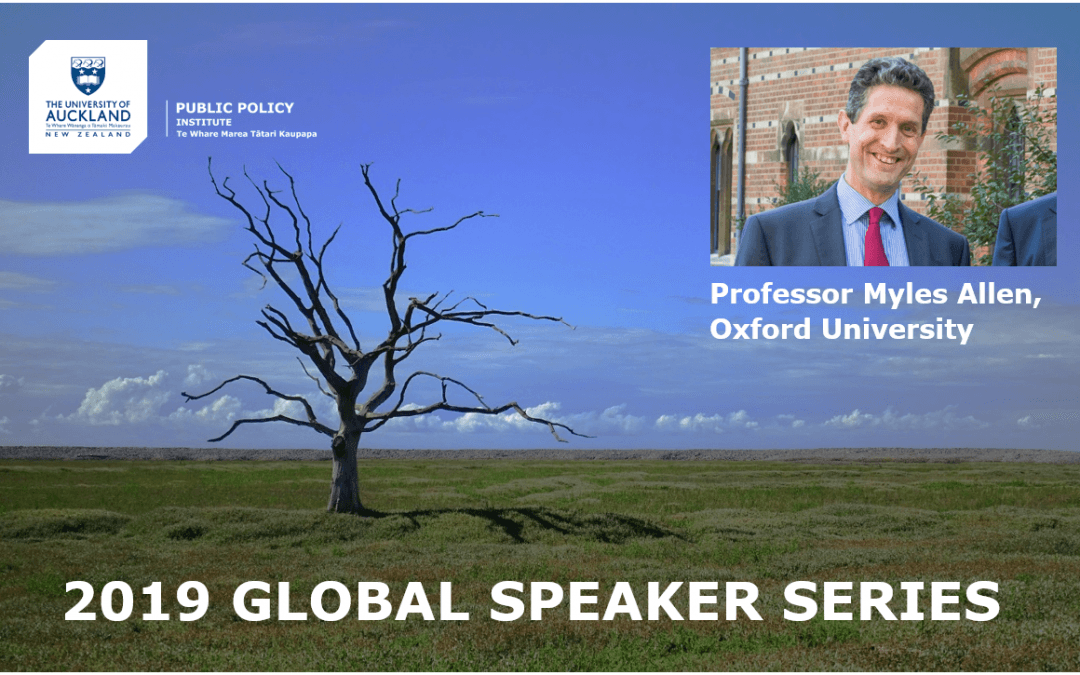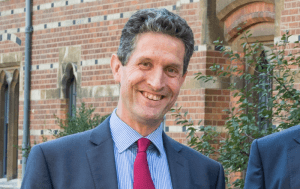As part of the 2019 Global Speaker Series, Professor Myles Allen will be giving a public lecture at the University of Auckland.
The recording of the lecture is available online
WHEN: Tuesday 19 March, 6-7.30pm
WHERE: Fisher and Paykel Auditorium,
Owen G Glenn Building (260-115),
University of Auckland Business School,
12 Grafton Road
Register for this event
Leading the World to Net Zero: The opportunities and challenges of New Zealand’s Zero Carbon Act
New Zealand’s Zero Carbon Act could make it one of the first advanced economies in the world to commit itself to net zero emissions — and the first with such a large agricultural sector. Like any pioneer entering uncharted waters, there are challenges to be overcome as well as first-mover opportunities. New Zealand’s decisions in 2019 could help frame the global climate agenda for many decades to come. The big picture is could not be simpler. Carbon dioxide emissions accumulate in the climate system, like lead in the bloodstream. Stopping global warming requires net carbon dioxide emissions to be reduced to zero, permanently. Decisions about other warming gases, like methane, could make a few tenths of a degree difference to the peak warming level reached, but they don’t change that all-important fact. And a permanent net zero world cannot rely indefinitely on forestry to offset continued use of fossil fuels in sectors like aviation.
A successful pathway to net zero needs clarity in the destination, and fairness and transparency in the transition. I will argue that the simplest way of designing fairness and transparency into the Zero Carbon Act is to focus on the long-term temperature goal set out in the Paris Climate Agreement. This means treating all sectors equally in terms of their impact on global temperature. Traditional farmers who are not contributing to ongoing global warming would not be penalised as if they are, while an agribusiness initiative that would cause a large increase in methane emissions, with a correspondingly disproportionate impact on global temperature, would be treated accordingly. And recipients of off-shore oil exploration permits would need to explain what will happen to the carbon dioxide that their oil will generate. Get this right, and New Zealand could show the way for many larger countries who have yet to think seriously about bringing extractive industries and agricultural emissions into climate policy. Treating all sectors fairly means all sectors pulling together. He waka eke noa.
Myles Allen is Professor of Geosystem Science in the School of Geography and the Environment, University of Oxford and Head of the Climate Dynamics Group in the University’s Department of Physics. His research focuses on how human and natural influences on climate contribute to observed climate change and risks of extreme weather and in quantifying their implications for long-range climate forecasts.
Myles has served on the UN’s Intergovernmental Panel on Climate Change (IPCC) as Lead Author on ‘Detection of Climate Change and Attribution of Causes’ for the 3rd Assessment in 2001, as Review Editor on ‘Global Climate Projections’ for the 4th Assessment in 2007, and as Lead Author on ‘Detection and Attribution of Climate Change: from Global to Regional’ for the 5th Assessment in 2013.
He proposed the use of Probabilistic Event Attribution to quantify the contribution of human and other external influences on climate to specific individual weather events and leads the www.climateprediction.net project, using distributed computing to run the world’s largest ensemble climate modelling experiments.
- Intergovernmental Panel on Climate Change
- Group leader of the Climate Dynamics Group (Oxford)
- Group Leader of the Climate Research Programme (Oxford)
- Oxford Martin Programme on Resource Stewardship
- Climatechang.net project leader
- Appleton Medal winner
- US NOAA/Dept of Energy International Advisory Group
Brought to you by the University of Auckland Public Policy Institute and the Tai Tokerau campus.


